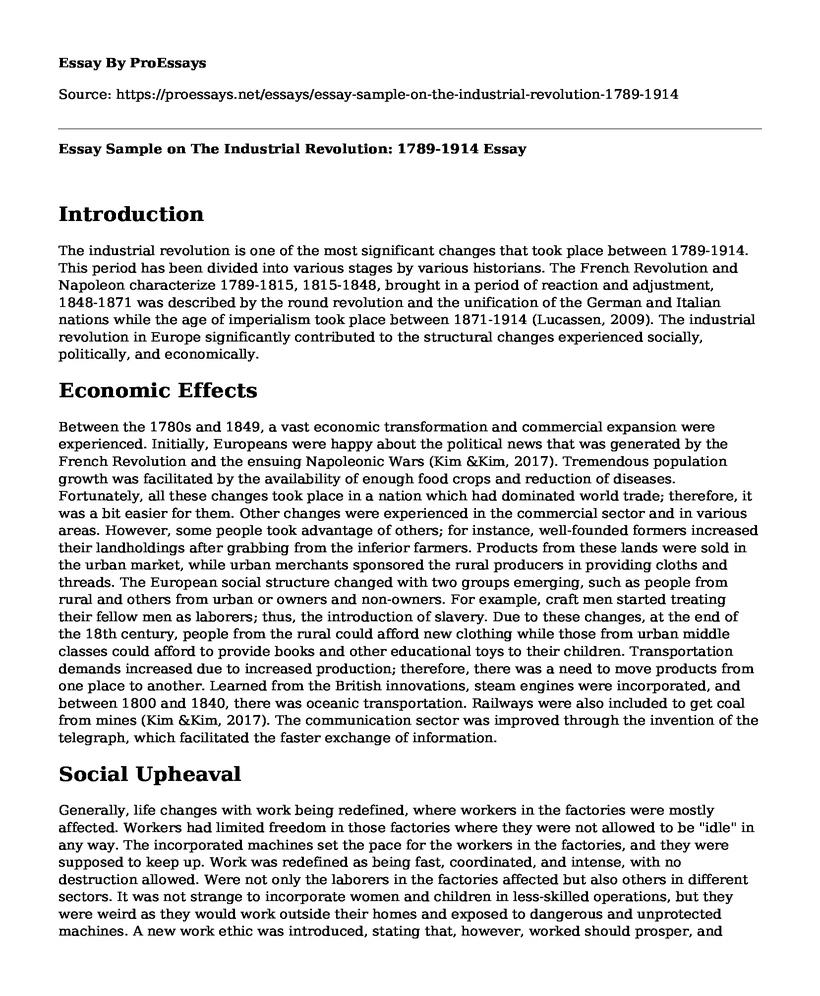Introduction
The industrial revolution is one of the most significant changes that took place between 1789-1914. This period has been divided into various stages by various historians. The French Revolution and Napoleon characterize 1789-1815, 1815-1848, brought in a period of reaction and adjustment, 1848-1871 was described by the round revolution and the unification of the German and Italian nations while the age of imperialism took place between 1871-1914 (Lucassen, 2009). The industrial revolution in Europe significantly contributed to the structural changes experienced socially, politically, and economically.
Economic Effects
Between the 1780s and 1849, a vast economic transformation and commercial expansion were experienced. Initially, Europeans were happy about the political news that was generated by the French Revolution and the ensuing Napoleonic Wars (Kim &Kim, 2017). Tremendous population growth was facilitated by the availability of enough food crops and reduction of diseases. Fortunately, all these changes took place in a nation which had dominated world trade; therefore, it was a bit easier for them. Other changes were experienced in the commercial sector and in various areas. However, some people took advantage of others; for instance, well-founded formers increased their landholdings after grabbing from the inferior farmers. Products from these lands were sold in the urban market, while urban merchants sponsored the rural producers in providing cloths and threads. The European social structure changed with two groups emerging, such as people from rural and others from urban or owners and non-owners. For example, craft men started treating their fellow men as laborers; thus, the introduction of slavery. Due to these changes, at the end of the 18th century, people from the rural could afford new clothing while those from urban middle classes could afford to provide books and other educational toys to their children. Transportation demands increased due to increased production; therefore, there was a need to move products from one place to another. Learned from the British innovations, steam engines were incorporated, and between 1800 and 1840, there was oceanic transportation. Railways were also included to get coal from mines (Kim &Kim, 2017). The communication sector was improved through the invention of the telegraph, which facilitated the faster exchange of information.
Social Upheaval
Generally, life changes with work being redefined, where workers in the factories were mostly affected. Workers had limited freedom in those factories where they were not allowed to be "idle" in any way. The incorporated machines set the pace for the workers in the factories, and they were supposed to keep up. Work was redefined as being fast, coordinated, and intense, with no destruction allowed. Were not only the laborers in the factories affected but also others in different sectors. It was not strange to incorporate women and children in less-skilled operations, but they were weird as they would work outside their homes and exposed to dangerous and unprotected machines. A new work ethic was introduced, stating that, however, worked should prosper, and whoever suffered did so because they did not work. Schools started praising work as a way of improving social status as it was experienced in schools from Prussian (Lucassen, 2009). Workers from the middle class found a new way to express themselves and attend to their leisure needs. Professional entertainers were paid to entertain middle-class workers who helped them get their mind away from the usual routine.
Before this devolution, a family was a productive unit, but this changed because family members worked away from home, so they were always away from home. Any successful family was set apart from the workstation, and therefore both institutions needed serious attention. Due to this, gender roles were redefined, bringing in married men as the sole provider of the family and women as domestic managers. Young workers were in a position to organize themselves without depending on inheritance, and they were not strictly manned. Older people acquired a new role in the society where they qualified to be baby sitters (Kim &Kim, 2017). The status of children in the community changed with the middle class recognizing the need to educate the children while most laborers class families considered children as a source of labor. Social status changed where the owners moved from the highly populated areas and settled in less populated areas of high standards. Due to this, a political quest was manifested. The middle-class people formed political protests intending to win against aristocratic monopoly.
Conclusion
Summing up, the industrial revolution and its effects were experienced in all three realms, which are the economic, social, and political realm. Economically, transportation, communication, and employment sectors took a novel way different from the old one. Socially, the family unit was re-structured while in the political realm, the quest for politics was introduced. Many changes that occurred have influenced the state of the nation up to date, both positively and negatively.
Reference
Kim, T. Y., & Kim, D. (2017). The Formation of Industrial Society in the United States. In The Secrets of Hegemony (pp. 169-206). Springer, Singapore.
Lucassen, J., & Lucassen, L. (2009). The mobility transition revisited, 1500-1900: what the case of Europe can offer to global history. Journal of Global History, 4(3), 347-377.
Cite this page
Essay Sample on The Industrial Revolution: 1789-1914. (2023, Mar 04). Retrieved from https://proessays.net/essays/essay-sample-on-the-industrial-revolution-1789-1914
If you are the original author of this essay and no longer wish to have it published on the ProEssays website, please click below to request its removal:
- Essay Sample on 2008 War Between Georgia & Russia: The Five-Day Battle
- The Legacy of Slavery: US History of African Americans - Essay Sample
- Essay Sample on Exploring Old, Weird America with Frederick Law Olmsted
- Essay Example on Hillary Clinton: From Presidential Candidate to Motivational Speaker
- Essay Example on The Magnificence of Pyramids: Timeless Testaments of History
- Essay Sample on Olmecs: Mexico's Ancient Rubber People
- Native Americans vs. European Americans - Essay Sample







